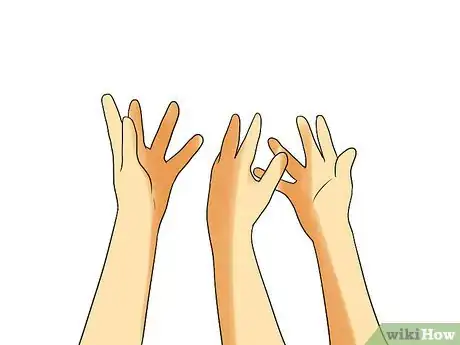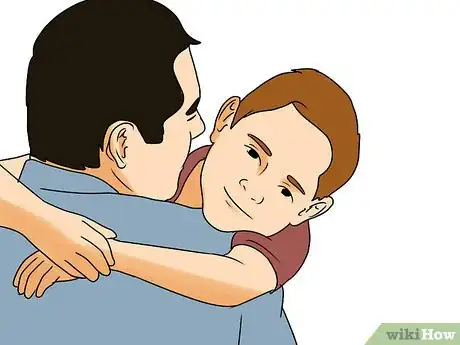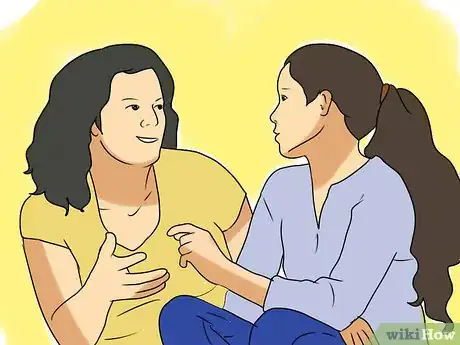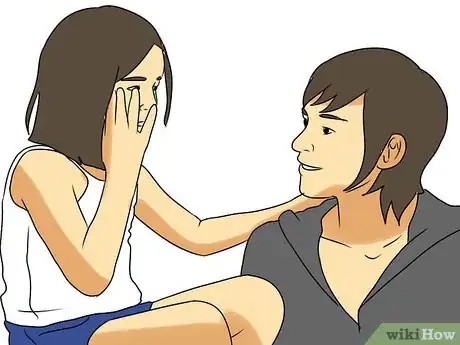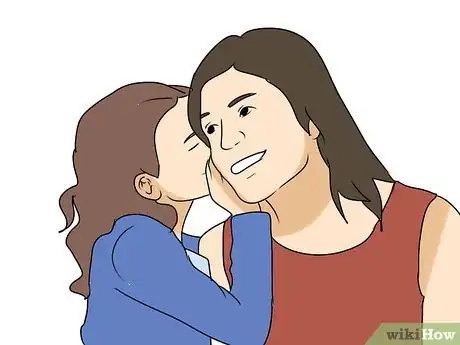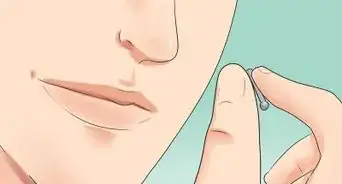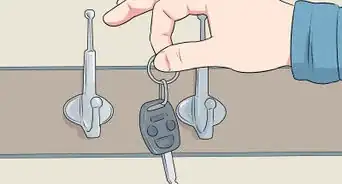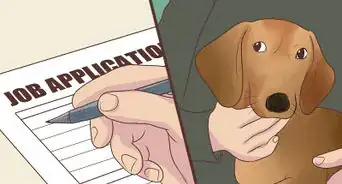This article was co-authored by Iddo DeVries, MA-SLP. Iddo DeVries is a Speech-Language Pathologist and the Owner and Clinical Director of Speech Therapy of DV Therapy, Inc. based in Los Angeles, California since 2014. Focusing on dynamic therapy for individuals and their families, Iddo specializes in family training and speech therapy for disabilities and delays including, autism, late-talkers, PDD, specific language impairments, articulation and phonological disorders, auditory processing delays, stuttering, pragmatic and social delays, Verbal Apraxia of Speech. Iddo holds a BS in Speech Communication Sciences from Brooklyn College and an MA in Speech-Language Pathology from Adelphi University. In 2011 Iddo was awarded the outstanding achievement award in the field of speech therapy by the New York City Department of Education. He has been an active member of the nationally accredited speech board ASHA since 2006.
This article has been viewed 25,832 times.
Autistic children (and adults!) find it difficult to interact with others, but most still want to connect and make friends. Teaching them how to socialize well will help them in their day-to-day life.
Steps
-
1Help them find fun ways to spend time with kids their age. This can be in the form of signing them up for clubs, finding sports teams, or helping them find groups associated with a favorite activity (e.g. dance). However, don't force these activities upon your child, because they will resent you for it.
- Consider the child's special interest when choosing activities. Interaction may be easier when it centers around one of the child's passions.
- Find autistic children, teens, or adults whom your child can meet and befriend. Meeting other autistic people will help build your child's self-esteem and show them that they aren't alone.
- Keep the situation as enjoyable and low-stress as possible. Children learn and grow the most when they have the freedom to have fun.
-
2Teach them social skills. There's no point throwing a child into a social situation when they aren't sure how to relate to others. Autistic people find socializing especially difficult, so they will need more support in this area than most children their age.
- Clearly explain social skills so that your child is not confused. For example, "It's polite to look at people when you're talking to you. If eye contact feels uncomfortable to you, you can try looking at somebody's eyebrows, mouth, hands, or general direction instead."
- Offer media that models good social skills. Many children's books will teach lessons (e.g. how to cope with a bully or how to share), and TV shows such as My Little Pony often teach constructive ways to respond to social situations. This allows children to learn in a fun, "safe" manner.
- Older children and teens might like self-help books about social interaction. Try picking up some well-known titles at the library, such as How to Win Friends and Influence People and The Seven Habits of Highly Effective People. They may also be interested in wikiHow articles, or resources written by autistic people (such as Realsocialskills).
-
3Be a good role model. Children learn by imitation, and your child will watch your actions to determine what is appropriate. Treat others with respect, ask questions, listen well, and take time to cool off if you feel angry or upset. Your child will watch you and begin doing the same.
-
4Offer emotional support. Respect your child's communication—verbal or nonverbal—and make time every day to talk and play together. When your child feels upset, ask them what's wrong instead of immediately punishing them, and offer to help them fix the problem and prevent it from happening again. This will help your child feel supported, and trust you enough to tell you if there are problems with friends.
-
5Be on the lookout for bullying. Most autistic children experience bullying in some form or another at some point because of their differences. They could be bullied by their classmates. Have regular conversations with your child, their teachers, and even the school principal to make sure that everything is okay for your child at school.
-
6Offer interaction opportunities, but don't push. Your child won't like socializing unless she feels that she is doing it by choice. If your child feels overwhelmed or wants quiet time, let them have quiet time. Trust that they will learn the skills to create friendships at their own pace.
Expert Q&A
-
QuestionHow do I get my autistic child to play with others?
 Iddo DeVries, MA-SLPIddo DeVries is a Speech-Language Pathologist and the Owner and Clinical Director of Speech Therapy of DV Therapy, Inc. based in Los Angeles, California since 2014. Focusing on dynamic therapy for individuals and their families, Iddo specializes in family training and speech therapy for disabilities and delays including, autism, late-talkers, PDD, specific language impairments, articulation and phonological disorders, auditory processing delays, stuttering, pragmatic and social delays, Verbal Apraxia of Speech. Iddo holds a BS in Speech Communication Sciences from Brooklyn College and an MA in Speech-Language Pathology from Adelphi University. In 2011 Iddo was awarded the outstanding achievement award in the field of speech therapy by the New York City Department of Education. He has been an active member of the nationally accredited speech board ASHA since 2006.
Iddo DeVries, MA-SLPIddo DeVries is a Speech-Language Pathologist and the Owner and Clinical Director of Speech Therapy of DV Therapy, Inc. based in Los Angeles, California since 2014. Focusing on dynamic therapy for individuals and their families, Iddo specializes in family training and speech therapy for disabilities and delays including, autism, late-talkers, PDD, specific language impairments, articulation and phonological disorders, auditory processing delays, stuttering, pragmatic and social delays, Verbal Apraxia of Speech. Iddo holds a BS in Speech Communication Sciences from Brooklyn College and an MA in Speech-Language Pathology from Adelphi University. In 2011 Iddo was awarded the outstanding achievement award in the field of speech therapy by the New York City Department of Education. He has been an active member of the nationally accredited speech board ASHA since 2006.
Speech-Language Pathologist Social scripts can be a helpful tool for autistic people when they're trying to communicate.
Social scripts can be a helpful tool for autistic people when they're trying to communicate. -
QuestionCan I be friends with an autistic person?
 Iddo DeVries, MA-SLPIddo DeVries is a Speech-Language Pathologist and the Owner and Clinical Director of Speech Therapy of DV Therapy, Inc. based in Los Angeles, California since 2014. Focusing on dynamic therapy for individuals and their families, Iddo specializes in family training and speech therapy for disabilities and delays including, autism, late-talkers, PDD, specific language impairments, articulation and phonological disorders, auditory processing delays, stuttering, pragmatic and social delays, Verbal Apraxia of Speech. Iddo holds a BS in Speech Communication Sciences from Brooklyn College and an MA in Speech-Language Pathology from Adelphi University. In 2011 Iddo was awarded the outstanding achievement award in the field of speech therapy by the New York City Department of Education. He has been an active member of the nationally accredited speech board ASHA since 2006.
Iddo DeVries, MA-SLPIddo DeVries is a Speech-Language Pathologist and the Owner and Clinical Director of Speech Therapy of DV Therapy, Inc. based in Los Angeles, California since 2014. Focusing on dynamic therapy for individuals and their families, Iddo specializes in family training and speech therapy for disabilities and delays including, autism, late-talkers, PDD, specific language impairments, articulation and phonological disorders, auditory processing delays, stuttering, pragmatic and social delays, Verbal Apraxia of Speech. Iddo holds a BS in Speech Communication Sciences from Brooklyn College and an MA in Speech-Language Pathology from Adelphi University. In 2011 Iddo was awarded the outstanding achievement award in the field of speech therapy by the New York City Department of Education. He has been an active member of the nationally accredited speech board ASHA since 2006.
Speech-Language Pathologist Of course! Try to be direct when you talk, and avoid abstract language, which may be hard for them to understand. It also helps to put yourself in the shoes of the autistic person and realize they may not easily understand social norms or expectations.
Of course! Try to be direct when you talk, and avoid abstract language, which may be hard for them to understand. It also helps to put yourself in the shoes of the autistic person and realize they may not easily understand social norms or expectations.
Warnings
References
- ↑ Iddo DeVries, MA-SLP. Speech-Language Pathologist. Expert Interview. 28 August 2020.
- ↑ How Applied Behavioral Analysis destroys children's sense of security
- ↑ http://www.thinkingautismguide.com/2013/02/the-cost-of-compliance-is-unreasonable.html
